Allah instructs us in the Qur’an to make du`a’ (supplication) for an increase in knowledge. We read and hear many examples of the benefits, virtue, and honor of seeking knowledge. Typically we envision those engaging in such a process to be struggling in a far off land, and sometimes that is the case. Far too seldom do we apply this to our children, who spend approximately six hours learning every day.
Our children face a variety of challenges in that process. In public schools the learning process is often done without any connection to an Islamic worldview, and many times promotes an atheistic one. We tend to think the remedy to that challenge is placing our children in private Islamic schools. Interestingly however, those schools often use the same textbooks for the majority of the school day and tack on an additional hour of Islamic Studies each day. This can create a dichotomy in the minds of our children whereby the perspective of most of the curriculum content may conflict with the Islamic one.
It may come as a surprise to hear, but to date, there is no complete Islamic curriculum in the English language. Dr. Bilal Philips recently told me that he has been working and pushing for this for fourteen years, yet very little has materialized. That is not to say that nothing has been done. Several complete Islamic Studies programs have been developed, and they are being used widely. Dr. Dawud Tauhidi—may Allah have mercy on him—made significant progress with the Tarbiyah Project. Dr. Nadeem Memon founded the Islamic Teacher Education Program in Canada. Those are just a few examples.
It might seem that the process of fixing the education problem is relatively simple: surely teachers in Islamic schools can simply adapt the content that runs counter to the Islamic worldview. This preventative method might work, however it places a great burden on teachers by requiring them to edit and adjust content on a daily basis. Another approach is to question the objective of education: why are we learning? One wisdom behind learning is that we have been created only to worship Allah, and that ought to be central to our learning process. In light of this, deleting troubling content from secular books will not achieve this aim. In order to do so, we need to rethink our approach.
One methodology, as developed by the Open Islamic Curriculum project, is to create a thematic curriculum that revolves entirely around Islam. No content is lost in the process; all the required subjects are taught within a framework of Islamic themes. The content is also integrated across subjects, such that the Islamic theme, for example Ramadan, continues to be reinforced throughout the school day and across all the subjects. Alhamdulilah (all praise and thanks belongs to God) the objective of that effort is to create materials that reinforce and build the Islamic worldview throughout the school day. And, to offer those materials freely in a modular way so that teachers can integrate whatever lessons, units, or subjects they need.
The Open Islamic Curriculum project launched a few months ago and needs your help. What we need is your time. If you have lessons you’ve developed, please share them. If you can create lessons, sign up to volunteer. If you want to get involved in raising awareness about the importance of Islamic Education, join the social media team. If you are from an IT background, help out with the website. Your ideas and time are welcome. We truly believe there is a great need to refine Islamic Education in our communities, and we also feel that this project will have immense benefits for students across the globe. Join us.
http://openislamiccurriculum.com/



AS
Important topic. Compared to 15 years ago much indeed has been realized. There are enough solid translations to create a curriculum up to the collegiate level. And if we were to add translations made by Orientalist (which are salvable) there are quite a number of works available.
I may be wrong but the problem really is an institutional one. There are not enough strong institutions to support and promote a curriculum that is worth speaking of and this is frankly because Muslims at this point do not value building educational institutions this is why we have more mosques than schools and the schools that we do have are suffering or have not gained the confidence of the community.
As a person who have deep interest in curriculum building I have to say we could easily build a curriculum but the question remains is there support to teach it in an institution that is self sustaining?
Jazakallah khair for discussing this very important topic!
We attended a private Catholic educational institute for 14 years. The VERY FIRST period of each day for 50 minutes was Religious Education for every class in the school. The teacing centred around the Bible and the Books therein. The exams were accordingly prescribed.
Islamic education should begin the day as an academic subject, not a recitation. It should provide knowledge, not dogmatic morality to critise the attendees.
Something tells me that an Islamic curriculum that has affiliations with Sheikh Bilal Phillips is not going to be able to provide an Islamic curriculum to children that articulates the vast diversity and power of Islamic tradition. Will students be allowed to learn about different schools of Fiq, tawwasuf, etc? Or will it solely focus on the outward expressions of Islam? Will this truly help our youth in developing into fully-functioning Muslims?
asSalaam alaykum,
You are welcome to see the resources available and email us anytime Yusuf. Hope to hear from you soon.
Here in Birmingham UK, Al-Hijrah School provides high quality secular and religious education. Catering for nearly 800 pupils, from ages 6-16, the school caters for both boys and girls and maintains a healthy environment by the use of a gender barrier – ie, although sharing the same campus, boys and girls are taught separately by same gender staff. And after many years of struggling as a private institution, the school is now funded by the UK government as a state school.
The point I wish to make is that with hard work, vision, and dua, it IS possible to establish Islamic education in the west. For more info, please visit our website, http://www.al-hijrah.org, or the main school website itself – http://www.alhijrahschool.co.uk
I have been teaching Islamic studies for several years and I like to teach many spiritual and enlightening aspects. I do not think that a hard and fast curriculum would be of benefit to young people who are looking for something to treasure in their hearts rather than to gain any paper certificate.
I’m sorry to say it, but the “Open” Islamic Curriculum Project looks like a very CLOSED indoctrination program of questionable authority and authenticity. The curriculum is taken almost exclusively from the most problematic teachers of Islam’s modernity and history, right out of the 1% fringe.
Dogma does not make one religious(taqi).
Opinion does not make one intelligent.
For Muslim children to know their Deen, they must learn from the authentic sources and the ones who actually teach the authentic sources.
For them to have wealth in knowledge, they have to be exposed to the wealth of Islam’s history, not the impoverished who were left lying on the side of the road of history.
For them to be spiritual, they have to have the examples of those who are spiritual.
For them to overcome the challenges they face, they have to develop the skill to apply Islam’s critique of the wrong ideas they encounter, and adopt the right ideas as solutions.
The OIC wouldn’t provide any of that.
[…] This article was first published on 30th of October 2012 on Suheib Webb. […]
Modern Islamic education also deals with the works of many classical scholars, as well as those notable scholars within a few centuries that has helped expand the knowledge in Islam and provide in depth understanding of the primary sources of law.